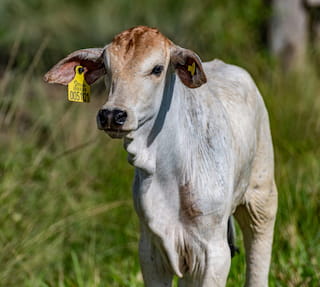Program puts calf producers at the forefront of livestock transformation

A partnership between Marfrig and IDH will enable 365 properties to be served by 2026
New investments are making it possible to expand the Sustainable Production of Calves Program, aimed at supporting producers in Mato Grosso, the state with the largest cattle herd in Brazil, which exceeds 34 million animals. The program results from a strategic partnership between Marfrig (one of the leading beef, pork, and poultry companies and the largest hamburger producer in the world) and IDH (a Dutch foundation that finances sustainable commodity production projects). In the first half of 2024, 106 properties in five municipalities in Mato Grosso state, Brazil, joined the program, with a goal to reach 365 farms by 2026.
The initiative, which is receiving investments of 1.75 million euros from Marfrig and 252,000 euros from IDH, is voluntary and offers farmers free guidance on production and financial management, cattle and pasture management, sanitary adjustments, environmental and land tittle regularisation, as well as an individual animal traceability system.
Marfrig’s goal in investing in the Sustainable Production of Claves Program is to promote the supply of sustainably sourced raw materials from the moment the animals are born. Part of the Verde+ Program, launched four years ago to make its supply chain 100% traceable and free of deforestation. The Calves Program contributes to changing the production and marketing dynamics of the livestock chain by improving the results of the calf segment in economic, environmental, and social terms.
Supporting and monitoring suppliers, especially indirect ones, is a challenge for the industry. Therefore, investing in initiatives like the Sustainable Production of Calves Program is an effective way to reach producers who are often located in very remote and vulnerable areas.
With specialised and personalised consultancy, results can be seen quickly. This is exemplified by cattle farmer Nardelli Rosa Moraes, who reports financial improvements due to the guidance he received.
I joined the program in January 2024, and the benefits have been significant, mainly due to the dedication of the staff. For instance, when it came to fertilizing, I was guided by a technician who visited the property, assessed my needs, and recommended the correct fertilizer. As a result, I saved about 40% to 50%.
Moraes operates the 135-hectare Caolli farm in the Tapaiunas community, a settlement in the municipality of Juara, located in the northwest of Mato Grosso. His success story inspires others to join the program and increases herd productivity. “My neighbors comment, ‘Your pasture looks like a bed of lettuce; it’s so green,’” says Moraes, who is also implementing individual animal traceability.
The Sustainable Production of Calves Program is committed to expanding sustainable practices by promoting environmental suitability, increasing herd productivity, and conserving and restoring forests. Among its goals are the conservation of more than 53,000 hectares of forest and the recovery of over 1,600 hectares.

The Program has been running since 2019 and has already benefited more than 600 producers in Mato Grosso state. It was recently expanded to the state of Pará, which has the second-largest herd in the country, with over 26 million animals.
We have a program with significant impacts that enhances our ability to establish new partnerships, drive progress, and expand results aimed at transforming the livestock chain from its origin.
